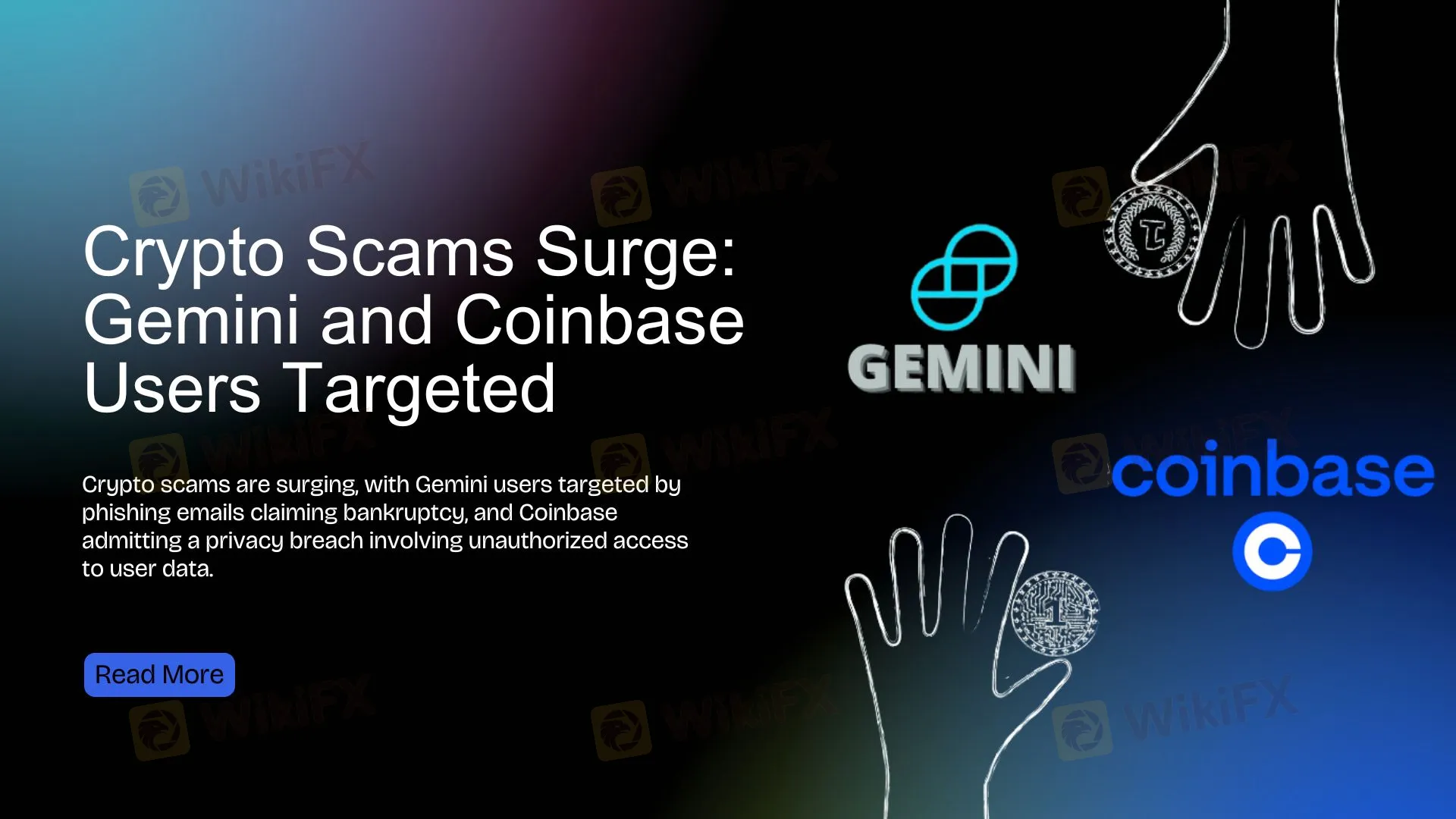简体中文
繁體中文
English
Pусский
日本語
ภาษาไทย
Tiếng Việt
Bahasa Indonesia
Español
हिन्दी
Filippiiniläinen
Français
Deutsch
Português
Türkçe
한국어
العربية
Crypto Scams Surge: Gemini and Coinbase Users Targeted
Abstract:Crypto scams are surging, with Gemini users targeted by phishing emails claiming bankruptcy, and Coinbase admitting a privacy breach involving unauthorized access to user data.

Fraudulent Emails Spread False Bankruptcy Claims About Gemini
In recent days, crypto users have reported receiving fraudulent emails falsely claiming that the cryptocurrency exchange Gemini had filed for bankruptcy. The phishing emails instructed recipients to withdraw their funds to a specified Exodus wallet address, providing a seed phrase to complete the process.
The emails alleged that Gemini had suffered losses of $1.2 billion and urged users to transfer their assets to protect their funds. Security experts have identified this as a classic phishing scam targeting inexperienced investors, attempting to trick them into sending their cryptocurrency to wallets controlled by scammers.
Gemini has issued an official warning on its platform, confirming that it will never request users to transfer crypto assets to external wallets. The exchange urged customers to verify information through official channels and avoid engaging with suspicious emails or links.
Coinbase Employee Accessed User Account Data Without Authorization
In a separate but related development, Coinbase disclosed a privacy breach involving one of its customer service employees. The employee was found to have accessed user account information without proper authorization.
Coinbase acknowledged the incident in an official communication to affected users. The company noted that the breach raised concerns about potential phishing attacks and fraudulent communications targeting Coinbase customers.
The disclosure followed reports from users who noticed an increase in phishing emails and scam phone calls impersonating Coinbase representatives.
Phishing Attacks Highlight Growing Risks in Crypto Industry
The incidents involving Gemini and Coinbase come amid a broader increase in crypto-related scams, as fraudsters seek to exploit the industrys rapid growth and rising retail participation.
Security analysts emphasize that users should remain vigilant, avoid sharing sensitive information, and use only official websites or verified apps when managing cryptocurrency accounts. The attacks also underline the growing importance of internal controls within exchanges to prevent privacy violations and protect user data.
As the adoption of digital assets expands, the crypto sector faces heightened security challenges, requiring both platform operators and users to exercise caution against evolving scam tactics.
Disclaimer:
The views in this article only represent the author's personal views, and do not constitute investment advice on this platform. This platform does not guarantee the accuracy, completeness and timeliness of the information in the article, and will not be liable for any loss caused by the use of or reliance on the information in the article.
Read more

Never Heard of Dynasty Trade? Here's Why You Should Be Worried
Have you heard this name before? No , it’s time you do because staying unaware could cost you. This platform is currently active in the forex trading and has been linked to several suspicious activities. Even if you’ve never dealt with it directly, there’s a chance it could reach out to you through ads, calls, messages, or social media. That’s why it’s important to know the red flags in advance.

Want to Deposit in the EVM Prime Platform? Stop Before You Lose It ALL
Contemplating forex investments in the EVM Prime platform? Think again! We empathize with those who have been bearing losses after losses with EVM Prime. We don't want you to be its next victim. Read this story that has investor complaints about EVM Prime.

WEEKLY SCAM BROKERS LIST IS OUT! Check it now
If you missed this week's fraud brokers list and are finding it difficult to track them one by one — don’t worry! We’ve brought together all the scam brokers you need to avoid, all in one place. Check this list now to stay alert and protect yourself from fraudulent brokers.

Catch the Latest Update on BotBro & Lavish Chaudhary
BotBro, an AI-based trading platform, became popular in India in 2024—but for negative reasons. Its founder, Lavish Chaudhary, who gained a huge following by promoting it heavily on social media. Since then, he has become well-known, but for many controversies. Let’s know the latest update about Botbro & Lavish Chaudhary.
WikiFX Broker
Latest News
Is Your Forex Strategy Failing? Here’s When to Change
FSMA Warns That Some Firms Operate as Pyramid Schemes
Apex Trader Funding is an Unregulated Firm | You Must Know the Risks
Sigma-One Capital Scam? Investors Say They Can’t Withdraw Funds
Federal Reserve likely to hold interest rates steady despite pressure from Trump. Here's what that means for your money
WEEKLY SCAM BROKERS LIST IS OUT! Check it now
Intel drops 9% as chipmaker's foundry business axes projects, struggles to find customers
Palantir joins list of 20 most valuable U.S. companies, with stock more than doubling in 2025
Textiles to whisky: U.K.–India 'historic' deal is set to boost bilateral trade by over $34 billion a year
Thailand-Cambodia border clashes: Cambodia's economy has more to lose, analysts say
Currency Calculator


